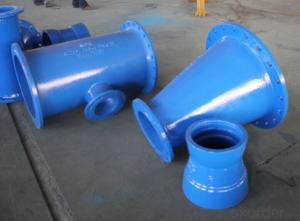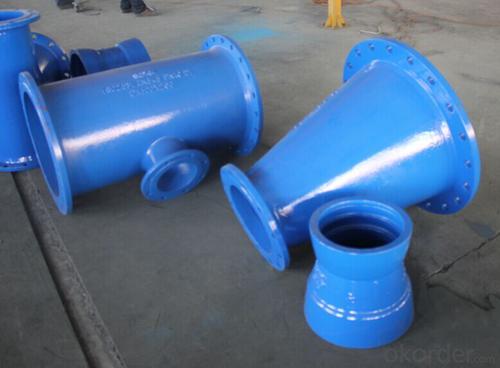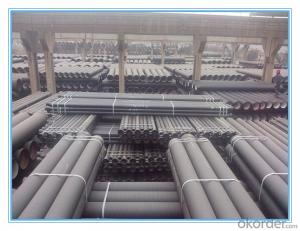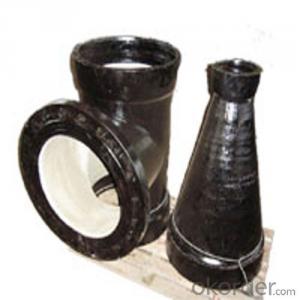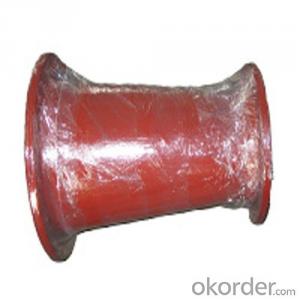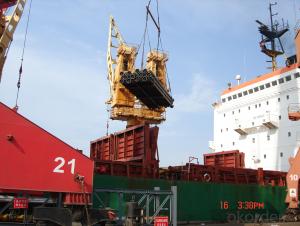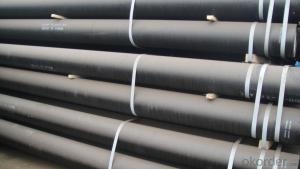DI Pipes in Water project,ductile iron double flanged taper with concentric
- Loading Port:
- Tianjin
- Payment Terms:
- TT OR LC
- Min Order Qty:
- 100 pc
- Supply Capability:
- 10000 pc/month
OKorder Service Pledge
OKorder Financial Service
You Might Also Like
DI Pipes in Water project,ductile iron double flanged taper with concentric
ISO 2531 / EN 545 / EN 598 / GB 13295
Specifications
Flanged Fittings
| Material | |
| Ductile iron grade 500-7 / 450-12 in accordance with ISO 1083 | |
| Flange | |
| P 10, PN16 or PN25 drilling in accordance with ISO 7005-2 / EN 1092-2 | |
| Fluid Temperature | |
| 0°C-50°C, excluding frost | |
| Coating | |
| External coatings | Internal coatings |
| zinc + bitumen painting liquid epoxy resin painting | cement mortar lining liquid epoxy resin painting |
| Reference Rules | |
| Dimensions and testing in accordance with ISO 2531 / EN 545 | |
| Use | |
| Jointed by the bolts, nuts and sealed by the gaskets. | |
China National Building Materials Group Corporation (CNBM) was established in 1984 with approval from the State Council, and then became a Central Enterprise under direct supervision of State-owned Assets Supervision and Administration Commission of the State Council in 2003.
Upholding the philosophy of “Making Best Use of Resources to Serve Construction”, and vigorously carrying out such strategies as “technical innovation”, “internationalization of building materials”, and “building strength with talents”, CNBM is the largest comprehensive building materials industry group in China that integrates scientific research, manufacturing and logistics into one entity, and consists of four business platforms, i.e. industry, technology, complete set of equipment, and trading & logistics. As of the end of 2009, CNBM’s total assets exceeded RMB 110 billion, with 100,000 employees, and 20 companies under direct management with 100% share control or majority control, among which 6 were listed companies, including 2 overseas listed.
CNBM practices the parent-subsidiary management system, and is one of those wholly state-owned enterprises carrying out the pilot trial of Board of Directors system and innovation system. As the strategic center, decision center, resources center, and policy & culture center, our Group exercises its right as a contributor. Whereas, our sub-groups functioning as business platforms, are mandated to construct the profit center based on their core competences to enlarge brand awareness and increase market share.
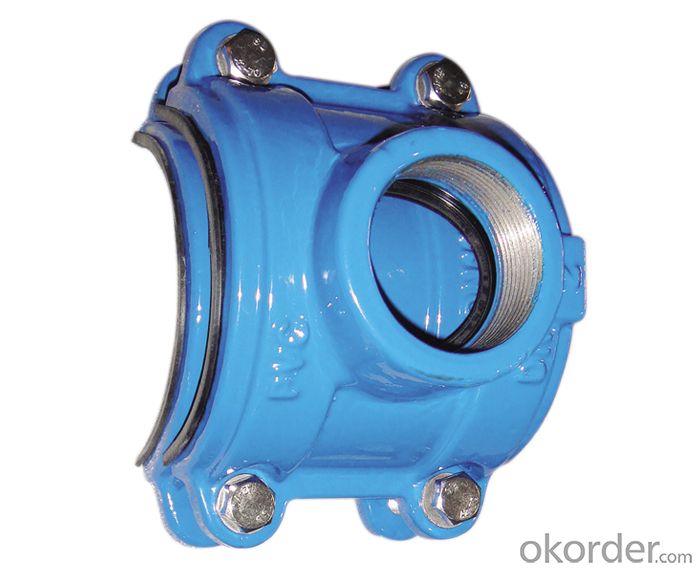
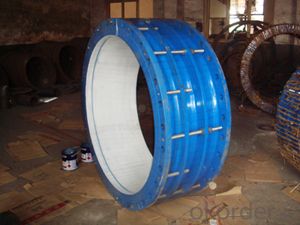
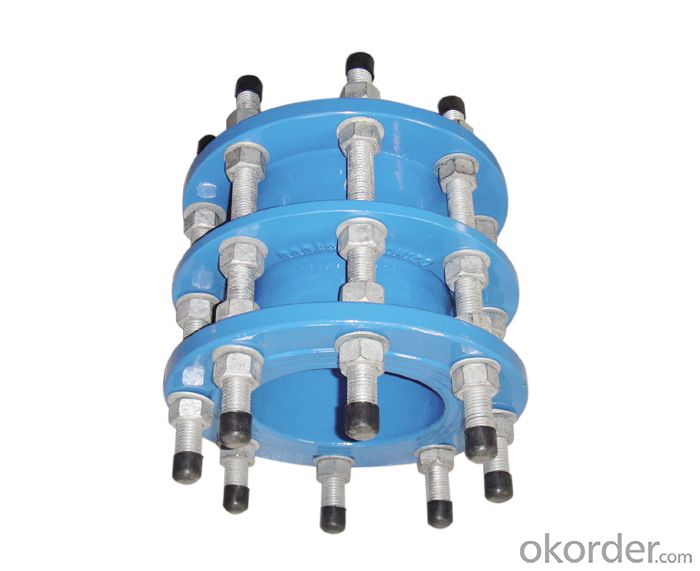
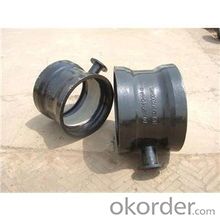
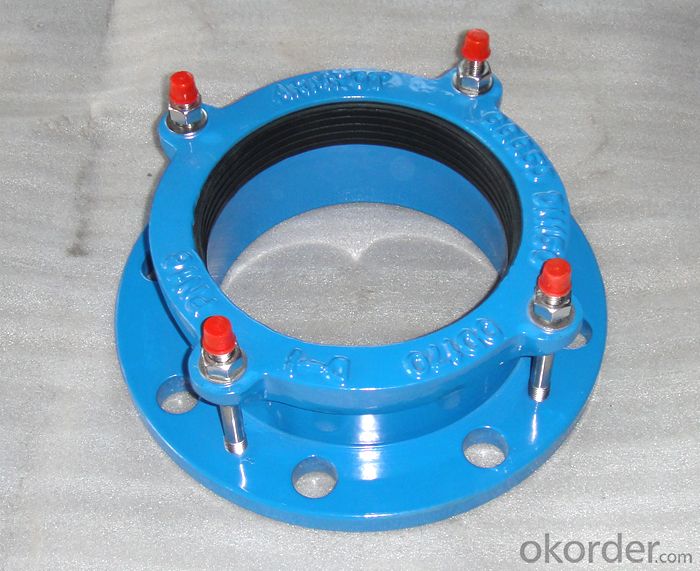
- Q: Can ductile iron pipes be used for underground steam distribution systems?
- Ductile iron pipes are well-suited for underground steam distribution systems. They belong to the cast iron family, but have been treated with magnesium to enhance their flexibility and resistance to cracking. Consequently, they can endure high pressure and temperature conditions, making them ideal for underground applications like steam distribution systems. The strength and durability of ductile iron pipes are remarkable, allowing them to withstand the extreme conditions associated with steam distribution. Moreover, their corrosion resistance properties make them a dependable choice for long-term use in underground environments. Nevertheless, it is essential to apply proper insulation to prevent heat loss and ensure the efficiency of the steam distribution system.
- Q: Can ductile iron pipe be used for horizontal directional drilling?
- HDD, a trenchless method for installing underground utilities like pipelines, can indeed utilize ductile iron pipe. The choice of ductile iron pipe in HDD projects stems from its remarkable strength, durability, and ability to withstand the strains and stresses associated with directional drilling. It exhibits exceptional resistance to external loads and can endure the bending and pulling forces involved in HDD installations. Nevertheless, it is crucial to consider variables like pipe diameter, wall thickness, and soil conditions when selecting the appropriate pipe for HDD projects. Furthermore, it is imperative to adhere to proper installation techniques and take precautionary measures to ensure the long-term performance and integrity of ductile iron pipe in HDD applications.
- Q: Are ductile iron pipes suitable for use in paper mills?
- Ductile iron pipes, known for their strength and durability, are well-suited for paper mills. With their excellent performance in various industrial settings, including paper mills, these pipes are able to withstand high-pressure systems and resist corrosion. This makes them suitable for transporting water, chemicals, and other fluids commonly used in paper mills. Moreover, the impact resistance of ductile iron pipes is advantageous in an environment with heavy machinery and equipment. In summary, ductile iron pipes are a dependable and enduring choice for paper mills, thanks to their strength, durability, corrosion resistance, and ability to handle high-pressure systems.
- Q: Are ductile iron pipes suitable for use in chemical processing plants?
- Yes, ductile iron pipes are suitable for use in chemical processing plants. Ductile iron is a type of cast iron that has enhanced mechanical properties, making it highly resistant to corrosion and suitable for handling various chemicals in industrial settings. It is known for its high tensile strength, durability, and flexibility, allowing it to withstand the high-pressure and temperature conditions often present in chemical processing plants. Additionally, ductile iron pipes have a smooth internal surface, which helps to minimize friction and reduce the risk of flow blockages or contamination. Overall, ductile iron pipes offer a reliable and cost-effective solution for transporting chemicals in chemical processing plants.
- Q: Does the cast iron have size 250? What's the performance?
- Ductile iron does not have size 250. Ductile iron is the beginning of QT, QT400-15, QT450-10, QT500-7 is the general use of nodular cast iron brand. Nodular cast iron welding can be determined, this should be in some high strength cast iron equipment used more, the tensile strength of normally ductile cast iron welding in welding is higher, is worse than the grey cast iron, it is actually very difficult to distinguish with the naked eye is ductile iron or cast iron the iron in the repair equipment, we usually use WE777 special cast iron electrode universal wide welding, but it is only for maintenance use, the effect is really good, reducing the risk of cracking and high strength welding rod matching to ensure the strength of welding seam.
- Q: What are the different corrosion protection options for ductile iron pipe?
- There are several corrosion protection options available for ductile iron pipes. These include internal linings such as cement mortar or polyethylene encasement, external coatings like zinc or polyethylene, and cathodic protection systems. Each option offers varying levels of protection and is chosen based on the specific needs and conditions of the pipe installation.
- Q: Ductile iron 600-3 grade, tensile strength, how to test, there is a simple way?
- 600-3 is pearlite + a small amount of ferrite matrix ductile iron. Pearlite edge region. 10%, center. 70600-3. Two sets of numbers indicating the grades and mechanical properties of nodular cast iron. The former represents the minimum tensile strength
- Q: The plug connection DN800 ductile iron pipe has been installed. "Shall I think so?"
- Ductile iron pipes are defined as pipes made by casting more than 18 of casting molten iron by adding a spheroidal agent and then centrifugally centrifugally cast by a centrifugal nodular cast iron machineDuctile iron pipe ([span]Ductile Cast Iron Pipes), referred to as ball pipe, ductile iron pipe and ductile iron pipe etc..
- Q: Can ductile iron pipes be repaired if they get damaged?
- If ductile iron pipes sustain damage, it is indeed possible to repair them. To carry out the repair, the first step involves identifying the specific section of the pipe that has been damaged, followed by assessing the extent of the damage. In the case of minor damage, there are several techniques available for repair, including welding or applying epoxy lining. However, if the damage is more severe, it may be necessary to replace certain sections of the pipe. Professionals who specialize in pipe repair possess the necessary skills and equipment to accurately identify and effectively fix damaged ductile iron pipes, thereby guaranteeing their ongoing functionality and durability.
- Q: Can ductile iron pipe be used for water distribution systems in cold climates?
- In cold climates, ductile iron pipe is an ideal choice for water distribution systems. This type of pipe is renowned for its strength and durability, making it suitable for a range of applications, including water distribution. Its exceptional ability to withstand external forces, such as freezing temperatures, frost heaving, and ground movement, is particularly advantageous in cold climates. Furthermore, ductile iron pipe exhibits a high tolerance for temperature fluctuations, ensuring its reliability for water transportation even in extreme cold conditions. Additionally, its corrosion-resistant properties guarantee the long-lasting and dependable performance of the pipe, even in harsh environments. Therefore, when it comes to water distribution systems in cold climates, ductile iron pipe is the optimal choice.
Send your message to us
DI Pipes in Water project,ductile iron double flanged taper with concentric
- Loading Port:
- Tianjin
- Payment Terms:
- TT OR LC
- Min Order Qty:
- 100 pc
- Supply Capability:
- 10000 pc/month
OKorder Service Pledge
OKorder Financial Service
Similar products
Hot products
Hot Searches
Related keywords
